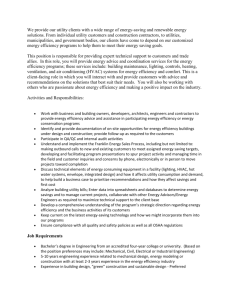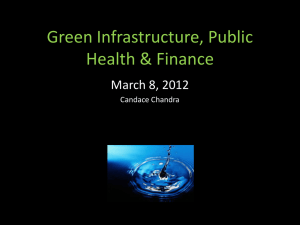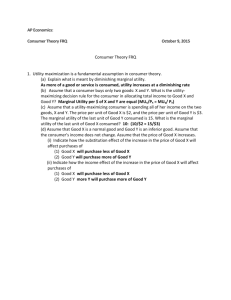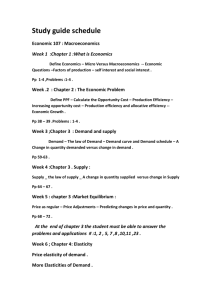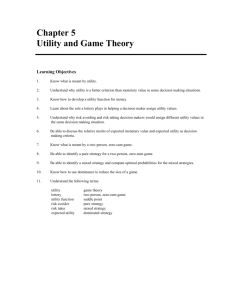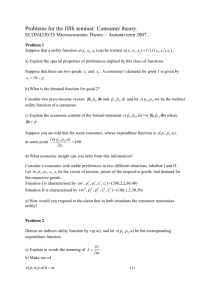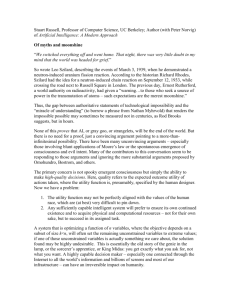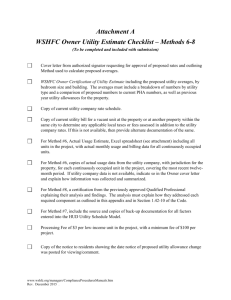Part 1
advertisement
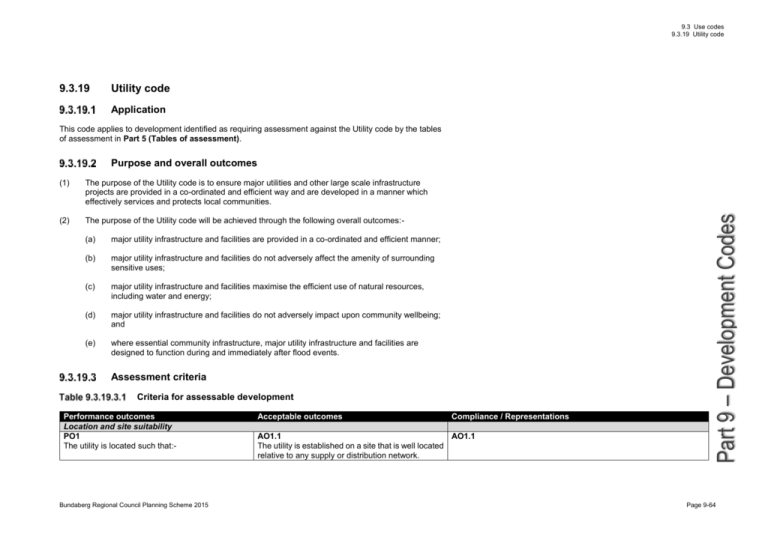
9.3 Use codes 9.3.19 Utility code 9.3.19 Utility code Application This code applies to development identified as requiring assessment against the Utility code by the tables of assessment in Part 5 (Tables of assessment). (1) The purpose of the Utility code is to ensure major utilities and other large scale infrastructure projects are provided in a co-ordinated and efficient way and are developed in a manner which effectively services and protects local communities. (2) The purpose of the Utility code will be achieved through the following overall outcomes:(a) major utility infrastructure and facilities are provided in a co-ordinated and efficient manner; (b) major utility infrastructure and facilities do not adversely affect the amenity of surrounding sensitive uses; (c) major utility infrastructure and facilities maximise the efficient use of natural resources, including water and energy; (d) major utility infrastructure and facilities do not adversely impact upon community wellbeing; and (e) where essential community infrastructure, major utility infrastructure and facilities are designed to function during and immediately after flood events. Assessment criteria Criteria for assessable development Performance outcomes Location and site suitability PO1 The utility is located such that:- Bundaberg Regional Council Planning Scheme 2015 Acceptable outcomes Compliance / Representations AO1.1 AO1.1 The utility is established on a site that is well located relative to any supply or distribution network. Part 9 – Development Codes Purpose and overall outcomes Page 9-64 9.3 Use codes 9.3.19 Utility code Performance outcomes (a) it is well placed relative to the infrastructure network that is services; (b) opportunities for cost efficiencies and reduction in environmental and social impacts are maximised; and (c) a high standard of accessibility is available for maintenance purposes and at times of emergency. Acceptable outcomes Compliance / Representations Provide a brief illustration of how your proposal complies with the AO1.2 relevant Acceptable outcome or a detailed analysis how compliance is Where practicable, the utility is co-located with achieved with the Performance outcome. another utility of a similar or compatible type. AO1.2 AO1.3 Example representations: The proposed development is not to be coThe utility is located on a site that can be easily located with another utility. It is considered the proposal complies accessed for maintenance purposes or at times of with PO1 as the utility is to be located to best service the sewerage emergency. network and ... Part 9 – Development Codes AO1.3 Click and provide your representations. Visual and amenity impacts PO2 The utility is sited and designed to:(a) minimise adverse visual impacts beyond the boundaries of the site; and (b) minimise adverse impacts on the amenity of nearby residential, community or other sensitive uses. PO3 The utility provides an attractive street front address with unsightly elements screened from view by walls and landscaping strips. Water, energy and waste use efficiency PO4 The utility is designed, constructed and operated in a manner that:(a) minimises energy use and greenhouse gas emissions; (b) minimises the use of water; and (c) maximises the re-use and recycling of byproducts associated with the operation of the utility. Building siting and design PO5 The siting and design of any buildings or structures associated with the utility are compatible with the Page 9-65 AO2 No acceptable outcome provided. PO3 Click and provide your representations. AO3 No acceptable outcome provided. PO3 Click and provide your representations. AO4 No acceptable outcome provided. PO4 Click and provide your representations. AO5 No acceptable outcome provided. PO5 Click and provide your representations. Bundaberg Regional Council Planning Scheme 2015 9.3 Use codes 9.3.19 Utility code Performance outcomes Acceptable outcomes setting and character of the local area in which the facility is located. Health and safety PO6 AO6.1 Public access is discouraged to those parts of the Security fencing is provided to prevent unauthorised utility that pose a health or safety risk. access to those parts of the utility that pose a health or safety risk. Compliance / Representations AO6.1 Click and provide your representations. AO6.2 Click and provide your representations. Recommended flood level PO7 The functioning of a utility that is essential community service infrastructure is maintained during and immediately after flood and storm tide inundation events. AO7 AO7 A utility that is essential community service Click and provide your representations. infrastructure is:(a) located in an area that is above the recommended flood levels identified in Table 9.3.19.3.2 (Recommended flood level for a Editor’s note—essential community service infrastructure utility that is essential community service is defined in Schedule 1 (Definitions). infrastructure); or (b) located and designed to ensure any components of the infrastructure that are likely to fail to function or may result in contamination when inundated by floodwaters (e.g. electrical switchgear and motors, water supply pipeline air valves) are: (i) located above the recommended flood level; or (ii) designed and constructed to exclude floodwater intrusion/infiltration. Recommended flood level for a utility that is essential community service infrastructure Type of utility Major switch yards and substations (refer to note) Power stations Sewage treatment plants (refer to note) Bundaberg Regional Council Planning Scheme 2015 Recommended flood level 0.5% AEP 0.2% AEP 1% AEP Part 9 – Development Codes AO6.2 Safety and warning signage is displayed where necessary. Page 9-66 9.3 Use codes 9.3.19 Utility code Type of utility Recommended flood level Water treatment plants (refer to note) 0.5% AEP o Works of an electricity entity not otherwise No specific recommended flood level but listed in this table development proponents should ensure that the o Communication network facilities infrastructure is optimally located and designed to achieve suitable levels of service, having regard to the processes and policies of the administering government agency. Part 9 – Development Codes Note—the recommended flood level applies only to electrical and other equipment that, if damaged by floodwater or debris, would prevent the infrastructure from functioning. This equipment should either be protected from damage or designed to withstand inundation. Page 9-67 Bundaberg Regional Council Planning Scheme 2015
